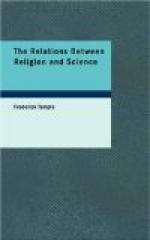Now this contention is an instance of a tendency against which we are required to be perpetually on our guard. The final aim of all science and of all philosophy is to find some unity or unities that shall co-ordinate the immense complexity of the world in which we live. Now there is one and only one legitimate way of attaining this aim, and that is by patient, persevering study of the facts. But the facts turn out to be so numerous, so multifarious, that not one life nor one generation but many lives and many generations will assuredly not co-ordinate them sufficiently to bring this aim within probable reach. Hence the incessant temptation, first, to supply by hypothesis what cannot yet be obtained by observation, and, secondly, to bend facts to suit this hypothesis; and, if the framing of such hypotheses be legitimate, the distortion of facts is clearly not legitimate. It seems too long to wait for future ages to complete the task. We must in some sort complete it now; and for that purpose if the facts as we observe them will not suit, we must substitute other facts that will. Accordingly every doctrine must be made complete, and to make this doctrine of the relativity of knowledge complete, we must get rid of all exceptions. But there is one exception that we cannot get rid of, and that is the conviction of our own identity through all changes through which we pass. Every man amongst us passes through incessant changes. His body changes; he may even lose parts of it altogether; he may lose all control over some of his limbs, or over them all. And there are internal as well as external changes in each man. His affections change, his practices, his passions, his resolutions, his purposes, his judgments; everything possibly by which he knows his own character. But through all these changes he is conscious of being still one and the same self. And he knows this; and knows it, not as an inference from any observation of sense external or internal, but directly and intuitively. All other knowledge may conceivably be relative, a knowledge of things as they appear, not of things in themselves. But this is not; it is a knowledge




